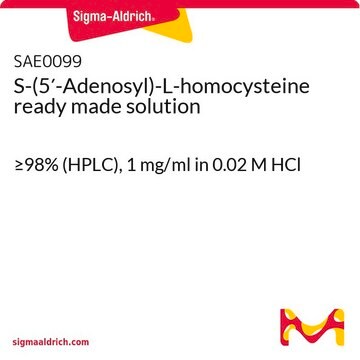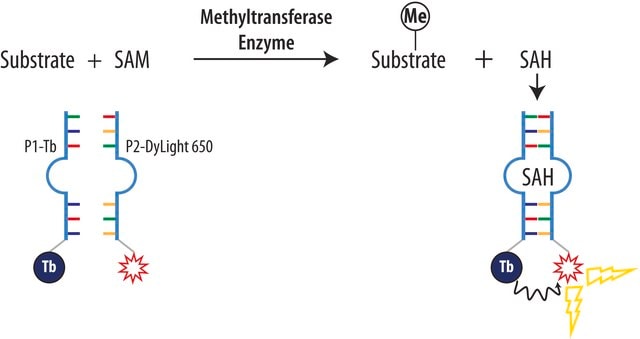A4377
S-(5′-Adenosyl)-L-methionine iodide
≥80% (spectrophotometric assay), suitable for cell culture
Synonym(s):
AdoMet, SAM
About This Item
Recommended Products
Product Name
S-(5′-Adenosyl)-L-methionine iodide, ≥80% (HPLC), ≥80% (spectrophotometric assay)
Quality Level
Assay
≥80% (HPLC)
≥80% (spectrophotometric assay)
form
powder
technique(s)
cell culture | mammalian: suitable
color
white to off-white
solubility
H2O: 100 mg/mL
shipped in
dry ice
storage temp.
−20°C
SMILES string
[I-].C[S+](CC[C@H](N)C(O)=O)C[C@H]1O[C@H]([C@H](O)[C@@H]1O)n2cnc3c(N)ncnc23
InChI
1S/C15H22N6O5S.HI/c1-27(3-2-7(16)15(24)25)4-8-10(22)11(23)14(26-8)21-6-20-9-12(17)18-5-19-13(9)21;/h5-8,10-11,14,22-23H,2-4,16H2,1H3,(H2-,17,18,19,24,25);1H/t7-,8+,10+,11+,14+,27?;/m0./s1
InChI key
XQMWYLXPEGFCFT-XKGORWRGSA-N
Looking for similar products? Visit Product Comparison Guide
Application
Biochem/physiol Actions
Caution
Analysis Note
Signal Word
Warning
Hazard Statements
Precautionary Statements
Hazard Classifications
Skin Sens. 1
Storage Class Code
11 - Combustible Solids
WGK
WGK 3
Flash Point(F)
Not applicable
Flash Point(C)
Not applicable
Personal Protective Equipment
Choose from one of the most recent versions:
Certificates of Analysis (COA)
Don't see the Right Version?
If you require a particular version, you can look up a specific certificate by the Lot or Batch number.
Already Own This Product?
Find documentation for the products that you have recently purchased in the Document Library.
Customers Also Viewed
Our team of scientists has experience in all areas of research including Life Science, Material Science, Chemical Synthesis, Chromatography, Analytical and many others.
Contact Technical Service













